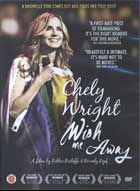
Chely Wright: Wish Me Away 2011
Distributed by First Run Features, 630 Ninth Avenue, Suite 1213, New York, NY 10036; 212-243-0600
Produced by Bobbie Birleffi and Beverly Kopf; Executive Producers Rhonda Eiffe, Richard Bever, and Fletcher Foster
Directed by Bobbie Birleffi and Beverly Kopf
DVD , color, 96 min.
Sr. High - General Adult
Religious Studies, Gay and Lesbian Studies, Popular Culture Studies
Date Entered: 03/07/2013
Reviewed by Anne Shelley, Music/Multimedia Librarian, Milner Library, Illinois State UniversityThis film follows country singer Chely Wright’s calculated coming out journey over a period of several months. Overall the film’s greatest accomplishment is making the viewer feel as powerless and out of control as Wright must have felt. Her emotions are raw and she shares them freely throughout the film. One of the best parts of Wish Me Away is how much we are treated to Wright’s music—it plays constantly in the background, from scenic shots of her home of rural Kansas to emotional conversations with her family to shots of her getting ready for publicity related to coming out events.
The film includes several interviews between the filmmakers and guests, including Wright’s former record executives and managers, her immediate family members, and Nashville radio announcers both before and after Wright’s coming out. Also included is an interesting and lengthy clip of Wright talking to Dick Clark on the show Prime Time Country, where he presses her about her romantic life and she expertly and persistently deflects every question without either lying or revealing her sexual orientation.
Both the filmmakers and Wright make clear to us that the fact she’s a country singer—someone who has made a career performing for an overall conservative listener base and ring of radio broadcasters and agents—complicates her situation enormously. Wright shared a story in which she was talking with another famous singer who asked if she was gay. She lied and said no, and he told her how glad he was because being gay is wrong and country music would never have it. She had enjoyed success in that community, and therefore had a ways to fall. At the height of her career, Wright was voted in the top twenty-five most beautiful country stars. (The title of Wright’s first #1 hit is “Single White Female,” and the irony of that fact is not lost on the viewer.)
Wright reveals her many conversations with God about her feelings toward women. At ten years old, she recognized these feelings and promised God she would not act on them and that would give God time to take those feelings away. Eventually, she realized the feelings would not go away, so she told herself she would come out after she scored a #1 single. After Wright achieved that goal, she did not come out but told herself she would do so after one of her albums reached the top ten. In reality, she waited much longer to deliver her promises to herself.
The film covers a short period of time after her coming out, when she could communicate with much more stability and confidence. At that point, her message changed, probably because her journey wasn’t so much about her anymore. Now that her secret is out, Wright concentrates on helping others find peace and transparency with their sexuality. Amidst clips of Wright marching in gay pride parades and performing on stages draped in a rainbow flag, the film informs us that since coming out, she’s received hate mail and death threats, but not one invitation from the country music community to write or produce a record. Highly recommended.
Awards